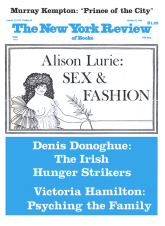A great deal of harmless gaiety went out of our lives when we began calling movies “films.” Prince of the City is a model instance of the movie that insists on being a film and proceeds inevitably to assault our common sense with the counterfeit of a moral lesson. It has been afforded a degree of critical respect extraordinary enough to rank it as a benchmark in the development of a process that our great-grandchildren, who had better be smarter than we are, will likely identify as the Dumbing of America.
Prince of the City’s subject is police corruption and its hero is Danny Ciello, a tainted narcotics detective who repents and helps the investigating prosecutors. Its villains are the prosecutors and their victims are Ciello’s fellow takers, who are offered as a company of charming rogues, although, except for Jerry Ohrbach, the actors who play them have been stimulated into excesses of strutting, braying, and bawling that would make any real crooked cop blush at their vulgarity.
Like all well-intentionedly false pictures, this one has its source in a reality. Danny Ciello is drawn from Detective Robert Leuci and these caricatures of cops are crudely modeled on his partners in the Special Investigations Unit of the Police Department. Nick Pileggi most manfully disposes of the presumed inoffensiveness of Leuci’s squad in a recent issue of New York Magazine. This is a band of brothers that took bribes from heroin dealers. Now and then, the more enterprising among them would sell the dope they had confiscated in the street.
The dumbing of America thus shows itself in the concentration on a minor moral problem to the entire neglect of a major one. Time was when police graft had its standards of decency; policemen took money from gamblers and bartenders who stayed open after hours, because they did not look upon the sins thus tolerated as crimes against society. But the heroin trade is deeply offensive to every impulse of humanity; and the Special Investigations Unit belongs to the history of the heroin trade not as antagonist but as a largely benign observer and in some cases partner. Is it possible to make a useful comment about moral decay and never wonder what has happened to a policeman when he is not ashamed of profiting off drug peddlers?
But, of course, our instruments of information are lamentably dependent on the information that is for sale in the market, and all that’s generally available are the recollections of a reformed criminal. First he writes his autobiography, and paints his sins with the lightest and his public service with the heaviest of brushes. Then the movies buy his book and distort it further to avoid impurities in the mixture appointed for heroes.
His true character is thus hopelessly lost, and any effort to find it and explain its conflicts carefully avoided. You cannot blame poor Treat Williams, who plays Ciello, for being unable to do anything in such a plight except scream and bellow. The informant is a fascinating creature; most of the time his purpose is his own safety and convenience; but sometimes the guilt of being a sinner is a factor. Yet guilt is never the only factor; and Danny Ciello cannot be believed because the conventions of film portrait dictate that true penitence is the only feeling worthy of a hero.
On the humble level of factual accuracy, Prince of the City is a parade of inauthenticities immediately recognizable to anyone remotely familiar with those recondite associations of conspirators we call law enforcement agencies. Prosecutors are now and then savages but they are not children. No policeman would think to tell an assistant district attorney that all society is a jungle, because he’s aware that an ADA knows that just as well as he does. No cop would talk to, let alone drink with and take into his sympathetic grasp, another cop rumored to be talking to prosecutors. And most of all, no group of prosecutors would seriously debate indicting an informant for perjury. They need him too much.
If Leuci says these things happen that way, he is not telling the truth; and, in the spirit of the old Special Investigations Unit, the producers of this film are peddling the goods of a dealer in fantasies. And next to heroin, fantasy can be the worst of drugs. These honest fools are making fools of us all.
This Issue
October 22, 1981



